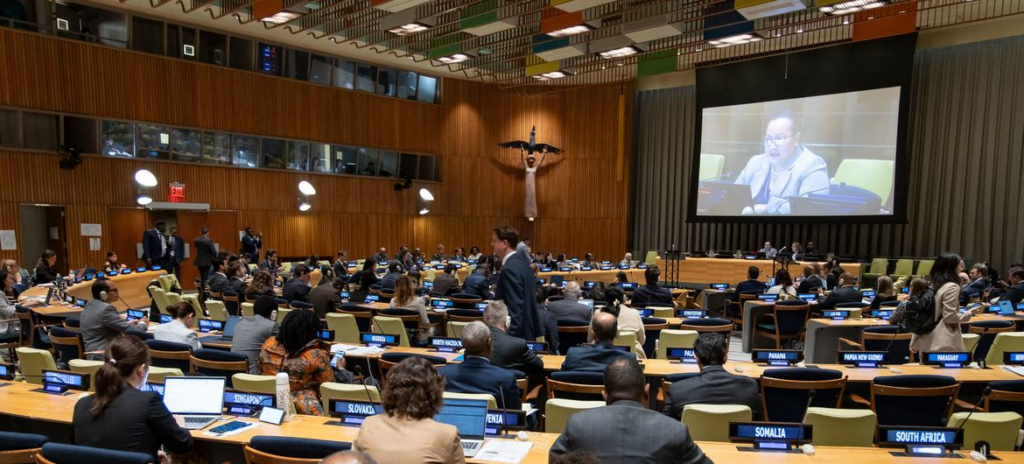What happened on Wednesday at UN: Focus on Lebanon; deepening geopolitical divides; rising seas

United Nations, 25 September 2024
Amid ongoing wars in Gaza, Ukraine, and Sudan – and the escalating risk of wider conflict in the Middle East – world leaders and senior UN officials at the General Assembly’s annual debate warned that deep geopolitical divisions are hindering progress on critical global challenges – from securing peace to climate change and UN reform. Many stressed however, that a better future for all lay in decisive and united multilateral action and commitment to the ideals of the UN Charter.
🔵 In his speech to the General Assembly, Ukrainian President Volodymyr Zelenskyy said that leaders he has met in New York this week “share the same understanding … [that any plan to end the conflict] must be a real, just peace”.
But he said the reality is that it is “impossible” to resolve such matters at the UN because they must go before the Security Council and any proposals must survive a veto by one of that body’s five permanent members (China, France, Russia, United Kingdom and the United States).
“When the aggressor exercises veto power, the UN is powerless to stop the war. But the peace formula … there is no veto power in it. That’s why it’s the best opportunity for peace,” he said of his proposal, which he presented in a briefing to the Security Council on Tuesday.
Find our coverage here.
More on Wednesday’s General Assembly debate here.
🔵 Separately, during a ministerial level meeting of the Security Council, UN Secretary-General António Guterres stressed that geopolitical divisions continue to block effective solutions. “A united [Security] Council can make a tremendous difference for peace. A divided Council cannot.”
“Peace in Ukraine is possible. By following the UN Charter and abiding by international law. Peace in Gaza is possible. By sparing no effort for an immediate ceasefire, the immediate release of all hostages, and the beginning of an irreversible process towards a two-State solution. Peace in Sudan is possible. By sending a clear message to the warring parties that all Members of this Council – including the five permanent members – will not tolerate the horrific violence and desperate humanitarian crisis being unleashed on innocent civilians.”
Find our coverage here.
Secretary-General’s remarks here.
🔵 France called a special Security Council meeting to discuss the escalating crisis in Lebanon. Addressing delegates, UN Secretary-General António Guterres urged the Council “to work in lock-step” to end the violence between Israeli forces and Hezbollah militants across the Blue Line in southern Lebanon.
“Hell is breaking loose in Lebanon” the UN chief warned, noting that the exchanges of fire along the UN-patrolled line of separation “have expanded in scope, depth and intensity.”
The UN chief said the daily violations across the Blue Line were in violation of key Council resolutions 1559 (2004) and 1701 (2006).
“To all sides, let us say in one clear voice: Stop the killing and destruction. Tone down the rhetoric and threats. Step back from the brink,” the Secretary-General said.
Find our coverage here.
Find more stories on Lebanon here.
Learn more about the Blue Line here.
🔵 One of the key events saw Member States and senior UN officials call for stepped-up action to end the war 17-month-long war in Sudan and to fast-track the humanitarian response inside the country and in the region.
“People in Sudan have endured 17 months of hell, and the suffering continues to grow,” said the UN’s top relief official Joyce Msuya, Acting Under-Secretary-General for Humanitarian Affairs and Emergency Relief Coordinator.
“Thousands of civilians have been killed, entire communities displaced and deprived of food, families scattered, children traumatized, women raped and abused. Decisive international action is urgent. We need humanitarian access to everyone in need, through all necessary routes, ramped-up funding for the response, ironclad commitments to protect civilians, and most of all, real and inclusive steps to end this ruinous war.”
Find our coverage here.
🔵 As conflicts dominated the discussions at the UN on Wednesday and grabbed worldwide headlines, leaders from small island developing States took the opportunity of high-level meetings at the General Assembly to raise the alarm on the existential threat of climate-driven sea-level rise which is threating the lives and livelihoods of countries around the globe.
In the day-long discussion, nearly 100 speakers took the floor, with many small island developing States and low-lying nations detailing their challenges, including lack of financing for mitigation and adaptation measures. Others outlined their technical and monetary support for vulnerable States.
The situation is critical, said UN General Assembly President Philémon Yang, who said it is estimated that sea levels will rise by 20 centimetres between 2020 and 2050, and up to 1.2 billion people could be forcibly displaced.
“For those on the front lines, the impacts of rising seas threaten livelihoods, inflict damage to settlements and critical infrastructure, and can in its most dramatic manifestations force the displacement of entire island populations and coastal communities,” he said.
Find our coverage here.
Here’s our explainer on sea-level rise.
🔵 Another highlight of Wednesday’s debate in the General Assembly was the call by Presidents from a host of small island developing States for stepped-up action and urgent attention to the existential crises the face, largely because of climate change.
Separated by oceans, the leaders were united in their call on the international community to prioritize urgent action and financial support to combat the climate crisis, emphasizing that their nations are in crosshairs of the emergency and already bearing its impacts.
As the small island States continue to fight for their survival, their united message to the world on Wednesday was clear, the time for action is now, and the global community must be united.
Find our coverage here.
The original article appeared here.